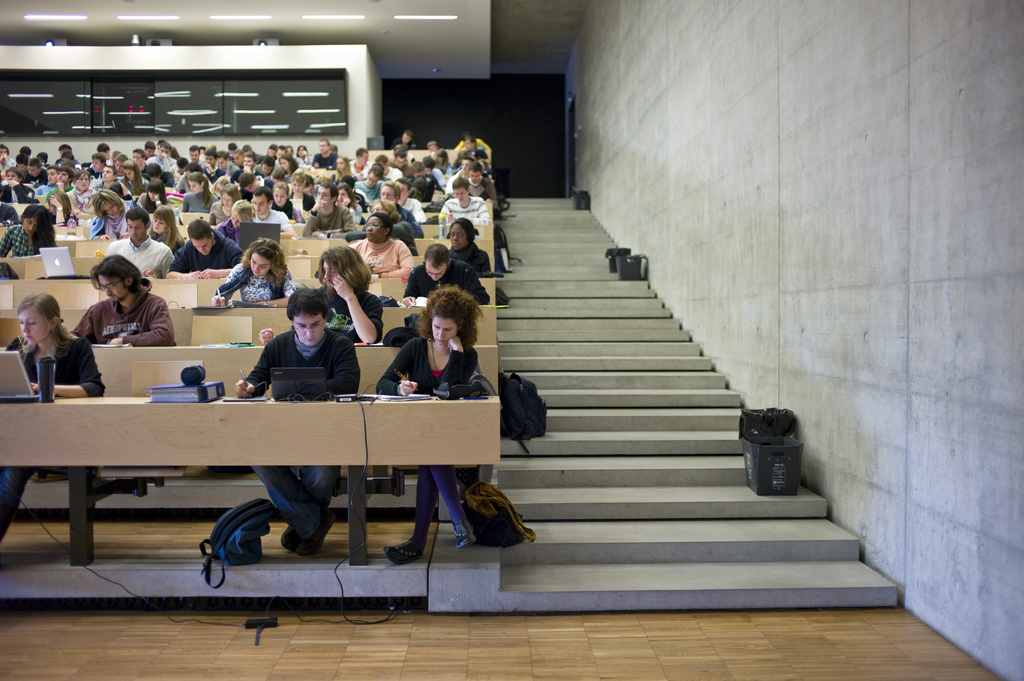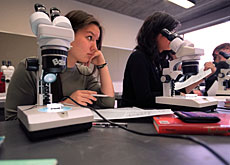Teacher shortage threatens schools

Swiss teachers spend more hours in front of their classes than do colleagues in neighbouring countries, but falling teacher numbers are resulting in new measures.
Switzerland is the only country in the Organisation for Economic Co-operation and Development (OECD) that trains its teachers in three years instead of four. It’s also the country whose teachers give the most lessons: 28-32 a week, compared with a European average of 20-24.
Teachers are using these statistics to push the authorities into taking measures. A dearth already means that in several cantons teachers are being employed in positions for which they have not been trained.
“The most serious shortfall is in the difficult classes, young teenagers, in maths and science,” said Anton Strittmatter from the German-speaking teachers’ association.
“The fact that fewer men are opting for this career is making the problem worse.”
According to the report on Swiss education 2010, published at the beginning of February, the “inadequate recruitment rates” (teachers without suitable qualifications for the level they are teaching) varied from less than one per cent (Jura) to around 16 per cent (Lucerne). Geneva said it wasn’t aware of the problem and Vaud didn’t provide statistics.
Serious situation
“We know that a third of Swiss teachers are going to retire in the next five to ten years,” said Georges Pasquier, president of the French-speaking teachers’ union, pointing out that the problem was more accentuated in the German-speaking part of the country, depending on the region.
There are various reasons for these fluctuations. The introduction of new courses, a reduction in the number of pupils in classes, the state of the employment market and new laws can all influence the demand for teachers. Not to mention the varying demographic evolution of one region or city compared with another.
Beat Zemp, president of the German-speaking teachers’ association, is equally concerned. On March 18 he attended the plenary meeting of the Swiss Conference of Cantonal Ministers of Education, where the issue was raised.
The politicians gave several positive signs, according to the teachers. “But I still have the impression that certain people responsible at a cantonal level have yet to recognise the gravity of the situation,” Zemp said.
Justified fear
Heinz Rhyn, head of the conference’s “quality development” department, strongly rejects the criticism.
“We take the problem very seriously! The fear of a shortage is justified, above all at secondary level one [young teenagers].”
But because education is the responsibility of the cantons, and because the problems depend to a great extent on regional demographic differences, the conference says it can’t launch a national recruitment campaign.
However, “for those people who come under our remit we will take measures,” Rhyn said, citing work on a legal recognition for training that would enable graduates to teach at secondary level one.
The Pedagogic Institute in Zurich (PHZH) is already working on this new degree course, and the conference assumes it will also be available elsewhere.
19th-century system
For Anton Strittmatter, even more extreme reforms are needed to boost the appeal of teaching as a career.
“The salaries aren’t competitive for a young generation that thinks in economic terms,” he said.
Teacher training remains a sizeable stumbling block between the teachers and the cantons.
“It’s unfortunate, but the conference doesn’t want to go beyond the current three years of training,” said Georges Pasquier, adding that at present Geneva was the only canton to spend four years training its teachers.
“We’re also demanding that people can graduate with Masters degrees from teaching institutions, which should become genuine institutes of tertiary education.
“In Finland, which gets excellent scores in the Pisa studies [a worldwide evaluation of 15-year-old school children’s scholastic performance], every teacher – even in a kindergarten – needs a Masters degree.”
He concluded: “I believe above all that we’re still just tinkering with the basic model, a throwback to the 19th century, with one teacher for one class.
“This model aims to educate an elite. The system remains selective, while we should be doing everything we can so that children don’t get left behind.”
Ariane Gigon, swissinfo.ch (Translated from French by Thomas Stephens)
The Swiss education system is undergoing a series of major reforms to make it more competitive globally.
A referendum in May 2006 approved government proposals to enhance coordination between different cantonal school systems and to give the federal authorities a bigger say in setting the educational agenda in future.
The Bologna Declaration of 1999 aims to create a European Higher Education Area by 2010.
Students and teachers will then be able to move between countries in the area, and degrees obtained in one country will be recognised in all the others.
Switzerland is one of 46 countries in Europe that have signed up to the accord.
The new university course is divided into two stages: three years for a Bachelor’s degree and two more to obtain a Master’s degree.
The first Bachelor courses started in Switzerland in 2001. The first degrees were awarded in 2004 (1,057, mainly in law and economy).
This year some 85 per cent of new students will be studying under the new system.

In compliance with the JTI standards
More: SWI swissinfo.ch certified by the Journalism Trust Initiative














You can find an overview of ongoing debates with our journalists here . Please join us!
If you want to start a conversation about a topic raised in this article or want to report factual errors, email us at english@swissinfo.ch.